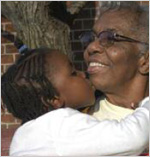
Caring for a Person with Alzheimer's Disease
Helping Family Members and Others Understand AD

Deciding when and how to tell family members and friends
When you learn that someone you love has AD, you may wonder when and how to tell your family and friends. You may be worried about how others will react to or treat the person. While there is no single right way to tell others, we've listed some things to think about.
Think about the following questions:
- Are others already wondering what is going on?
- Do you want to keep this information to yourself?
- Are you embarrassed?
- Do you want to tell others so that you can get support from family members and friends?
- Are you afraid that you will burden others?
- Does keeping this information secret take too much of your energy?
- Are you afraid others won't understand?
Realize that family and friends often sense that something is wrong before they are told. AD is hard to keep secret. When the time seems right, it is best for you to be honest with family, friends, and others. Use this as a chance to educate them about AD.
For example, you can:
- Tell them about the disease and its effects.
- Share books and information to help them understand what you and the person with AD are going through.
- Tell them they can learn more. (See the section "When You Need Help").
- Tell them what they can do to help. Let them know you need breaks.
Help family and friends understand how to interact with the person who has AD. You can:
- Help them realize what the person still can do and how much he or she still can understand.
- Give them suggestions about how to start talking with the person. For example, "Hello George, I'm John. We used to work together."
- Help them avoid correcting the person with AD if he or she makes a mistake or forgets something.
- Help them plan fun activities with the person, such as going to family reunions; church, temple, or mosque gatherings; other community activities; or visiting old friends.
Communicate with others when you're out in public. Some caregivers carry a card that explains why the person with AD might say or do odd things. For example, the card could read, "My family member has Alzheimer's disease. He or she might say or do things that are unexpected. Thank you for your understanding."
The card allows you to let others know about the person's AD without the person hearing you. It also means that you don't have to keep explaining things.

Helping children understand AD
When a family member has AD, it affects everyone in the family, including children and grandchildren. It's important to talk to them about what is happening. How much and what kind of information you share depends on the child's age. It also depends on his or her relationship to the person with AD.
Give children information about AD that they can understand. There are good books about AD for children of all ages. Some are listed on the Alzheimer's Disease Education and Referral (ADEAR) Center website, www.nia.nih.gov/alzheimers.
Here are some other suggestions to help children understand what is happening:
- Answer their questions simply and honestly. For example, you might tell a young child, "Grandma has an illness that makes it hard for her to remember things."
- Help them know that their feelings of sadness and anger are normal.
- Comfort them. Tell them no one caused the disease. Young children may think they did something to hurt their grandparent.
If the child lives in the same house as someone with AD:
- Don't expect a young child to help take care of or "babysit" the person with AD.
- Make sure the child has time for his or her own interests and needs, such as playing with friends, going to school activities, or doing homework.
- Make sure you spend time with your child, so he or she doesn't feel that all your attention is on the person with AD.
- Help the child understand your feelings. Be honest about your feelings when you talk with a child, but don't overwhelm him or her.
Many younger children will look to you to see how to act around the person with AD. Show children they can still talk with the person, and help them enjoy things each day. Doing fun things together can help both the child and the person with AD.
Here are some things they might do:
- Do simple arts and crafts.
- Play music.
- Sing.
- Look through photo albums.
- Read stories out loud.
 Some children may not talk about their negative feelings, but you may see changes in how they act. Problems at school, with friends, or at home can be a sign that they are upset. You may want to ask a school counselor or a social worker to help your child understand what is happening and learn how to cope. Be sure to check with your child often to see how he or she is feeling.
Some children may not talk about their negative feelings, but you may see changes in how they act. Problems at school, with friends, or at home can be a sign that they are upset. You may want to ask a school counselor or a social worker to help your child understand what is happening and learn how to cope. Be sure to check with your child often to see how he or she is feeling.
A teenager might find it very hard to accept how the person with AD has changed. He or she may find the changes upsetting or embarrassing and not want to be around the person. It's a good idea to talk with teenagers about their concerns and feelings. Don't force them to spend time with the person who has AD. This could make things worse.
If the stress of living with someone who has AD becomes too great for a child, think about placing the person with AD into a respite care facility. Then, both you and your child can get a much-needed break. See "Respite Services" for more information about respite care.
Publication Date: July 2012
Page Last Updated: July 20, 2012


